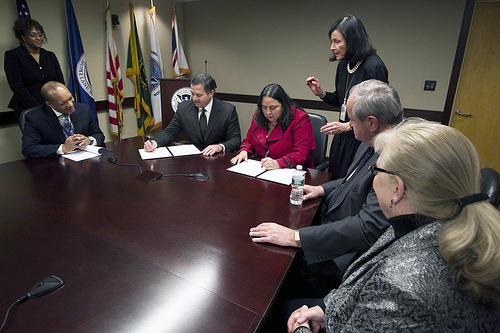


Assistant Labor Secretary Kathleen Martinez (seated at center, in red) says proposed rule for government contractors is designed to aid them in tracking efforts to hire people with disabilities, not penalize companies who do not.
The leading official from the Office of Disability Employment Policy (ODEP) has elaborated on the U.S. Labor Department’s proposed rule that would require companies seeking federal contracts to have 7% of their workforce comprised of people with disabilities, answering concerns voiced by critics of the measure during the public comment period.
In a wide-ranging, two-part interview with the online publication, Disaboom.com, Assistant Secretary of Labor Kathleen Martinez said the goal of the proposed rule “is neither a quota nor a hiring ceiling.” As we noted yesterday, one of the chief concerns expressed by the business sector was being penalized for not achieving the hiring goal; a circumstance that may occur because there would not be an adequate number of people with disabilities with the necessary job skills rather than a lack of effort to comply.
Martinez repudiated this line of thinking in the interview, saying companies would not necessarily be found in violation of the policy if they could demonstrate their efforts to recruit people with disabilities through quantifiable data, which is exactly what the proposed rule facilitates:
Progress toward the goal under the proposed rule would be monitored in a similar fashion to the goals established for minorities and women under Executive Order 11246. Contractors are required to track and maintain data on their personnel activity and workforce composition as part of their written affirmative action plan, and to assess progress toward their goals.
Martinez goes on to underscore the importance of the measure by noting that one in every four people hired in the United States works for a Federal Contractor. She also says that the Obama administration is holding itself accountable by setting a goal of adding jobs for 100,000 people with disabilities in government departments and agencies by 2015.
In part one of the interview, Martinez highlighted a number of current programs that would provide training for people with disabilities to enter the workforce and be productive in an inclusive environment. The newest among them being the “Skills to Pay the Bills” curriculum which works on fundamental concepts of workplace communication skills, including teamwork, critical thinking, and problem solving.
Martinez also cites the success of the Campaign for Disability Employment discussed here previously, and mentions Massachusetts as one of the states that has formally adopted its “What Can YOU Do?” theme. She adds that her office is also planning a Manufacturing Sector Summit in June, which will make industry leaders aware of the value people with disabilities can bring to their labor force.
Comments?
Image by CBP Photography (U.S. Customs and Border Protection), used under its Creative Commons license.